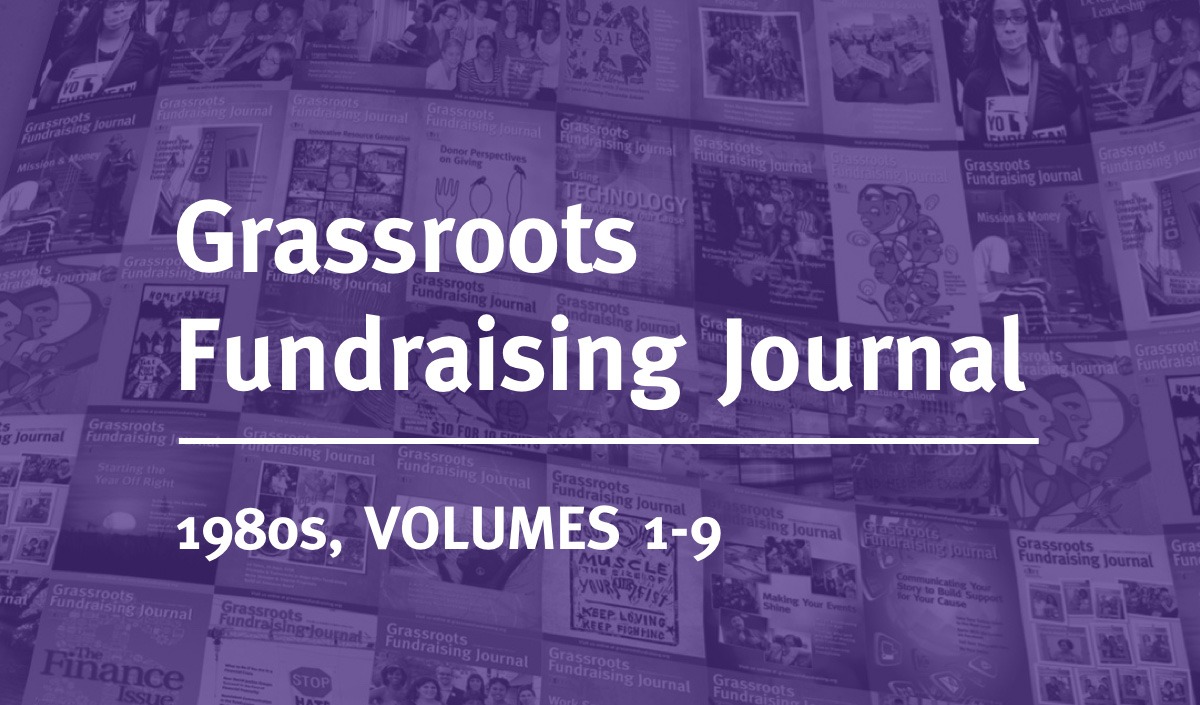
Editors’ note: This article, first published in print during October-1984, has been republished for Nonprofit Quarterly with minor updates.
Imagine being in a clothing store where you are trying on an expensive outfit. The salesperson helps you find a mirror, and asks how you like the outfit. You say, “Fine, but it is not my color.” The salesperson says, “Well, I’m sorry you feel that way,” and, discouraged, walks away.
Anyone would agree that this salesperson needs a basic course in selling. Yet, many solicitors for nonprofit organizations walk away from their prospect because of no more serious put-off than, “It’s not my color.”
For most people, once they overcome the fear of asking for a donation, the next problem is learning how to respond to put-offs — those little phrases that are not “no’s,” but whose intent seems to be to make you back off and leave the prospect alone.
As the solicitor, you encounter put-offs at two stages of the solicitation process: when you phone the prospect seeking a meeting, and when you meet with the prospect seeking the gift. Although the purpose of these put-offs varies with each prospect, it is likely that the prospect’s motive for trying to put you off and what you think his or her motive is, are entirely different.
In America, we have a strongly developed sense of politeness: some topics are polite to talk about and others are not. Sex and money are not polite topics of conversation. The weather is. Your health, what you do for a living, and where you live are sometimes polite topics of conversation and sometimes not, depending on whom you are talking to. With such a finely tuned system of politeness, we are carefully taught to “read between the lines,” “get the hint,” “take a cue,” etc. These are all methods of figuring out what a person is saying when they are too polite to come right out and say it. The margin for error is enormous.
Politeness affects the solicitation process when, for example, the prospect tells you, “This is a terrible time of year for me,” and you politely take it as a hint that the answer is no. The prospect may, however, be trying politely to prepare you for the fact that his or her gift will be $2500 instead of $5000. If you end the conversation without pursuing any gift, you will wind up with no money, and worse, a prospect who may be insulted that the gift he or she would have offered has been rejected.
Not Without a Struggle
How, then, can we deal more effectively with put-offs? First, understand that few people will agree to give away their money without any struggle. Prospects want you to work for the gift, so they will ask questions and make comments that may sound unpromising.
Second, prospects need to have a way to identify serious requests and organizations among all the requests they get. One way a prospect determines this is to make sure that the person asking for the gift has carefully researched the prospect and is sincere in his or her effort to make contact with the prospect. A prospect needs to know that his or her name has not merely been taken at random from a list of rich people, the phone book, the list of donors to the symphony, etc. The prospect must know that his or her interests have been taken into account in this request, not merely his or her ability. One quick way a prospect can determine that the request is serious is by making the solicitor respond to put-offs and answer difficult questions.
Finally, many comments that solicitors interpret as put-offs are simply the prospect thinking out loud and trying to be cooperative. A prospect may say, for example, “I’m just about to go on vacation, and then, when I get back, I have to get the kids back in school.” By this, the solicitor may hear, “She doesn’t want to see me; she is putting out all these time constraints to make me go away.” In fact, the prospect could mean “I’d like to see you, but finding a time in the next few weeks will be difficult. I hope you’ll be patient.”
Respond to Face Value
The best way to avoid misinterpreting a put-off is not to hear, “No, I won’t give” in any phrase except, “No, I won’t give,” “Get lost,” or something equally final. Act as if the put-off is literally true. Take every statement at face value. If a prospect says, “I never make this kind of decision without talking to my wife,” say, “I appreciate that. May I see you both?” Your hidden message is, “I believe you and I will try to accommodate you in this regard.”
When you take statements straightforwardly, the prospect also feels free to be honest and straightforward. No one needs to dance around in a fog of mixed messages passing for politeness.
The following are the most common put-offs and various possible come-backs to them. Notice that in every case the put-off has been taken seriously and literally. (The put-offs are in bold letters.)
Hello, this is Good Boardmember representing Worthy Cause. I’m calling to follow up on my letter. Do you have a minute to talk ?
No.
I’m sorry l’ve caught you at a bad time. I’ll call you tomorrow.
I just have a minute. I’m on my way out the door.
Well, a minute is all I need because I’d like to make an appointment to see you to discuss Worthy Cause. Do you have about 30 minutes free sometime next week?
What letter are you talking about?
I sent a letter about our organization at the suggestion of Jane Friendswithyou. Let me just tell you quickly what it said.
I’ve given away all the money I am going to give this year.
Thanks for being so candid. If you have the time, I’d still like to meet with you to discuss our program. Perhaps you could suggest some people we should approach, and consider letting us be on your list for next year.
Sign up for our free newsletters
Subscribe to NPQ's newsletters to have our top stories delivered directly to your inbox.
By signing up, you agree to our privacy policy and terms of use, and to receive messages from NPQ and our partners.
My financial picture has changed drastically and I don’t have the money.
I’m sorry to hear that. I’d still like to talk to you about our program because in addition to suggesting your name as a possible donor, John Yourclosebuddy says that you know a good many people at City Hall and could be helpful in suggesting strategies to use in our low-income housing work (Note: requests for advice must be genuine).
I like your group. How about if I send you $25 and save us both time?
If that is what you would like to do, we’d be delighted, but I’d like to press my luck a little bit and ask you not to decide on an amount until we’ve had a chance to talk. I know time is a big factor, but I promise not to take more than 30 minutes.
I need more information. Your letter was a little scanty.
I’ll bring a lot of information with me, and we can discuss all of your questions.
Since you are a government-supported/United Way-supported agency, I have already given through my taxes/by giving at the office.
Yes, indeed you have. But we are not fully supported and must raise additional money from our community. In effect, I want to talk with you about increasing your gift by making a direct donation to our organization.
There are so many worthy causes. I have to draw the line somewhere.
I appreciate that, and I understand you are involved in many things. Before you draw the line at our organization, though, I’d like to talk with you about it. Even if you decide not to give, perhaps you can suggest others who could help.
I like your work on X Issue, but completely disagree with Y.
Let’s talk specifically about the program you like and about making an earmarked contribution to that program.
It goes against my morals to support any group in favor of Y.
That will make it hard for you to give to our group. If I could, I would like to talk with you about both X and Y and then if you still feel strongly about it, we’ll let it go.
How much of your money goes to administrative overhead?
I’m glad you asked that. We are pleased with the measures we take to keep costs down, and I’ll bring a financial report to illustrate that. As you know, the answer is more complicated than a mere percentage.
Why aren’t you just approaching foundations and corporations? They are the ones with the money.
They do seem to have a lot of money. What most people don’t realize is that foundations and corporations only give about 10% of all the money donated by the private sector. When we meet, I’ll show you our community fundraising plan and tell you in more detail about why we need people like you to become donors.
Each solicitor will run into these and many other put-offs. You can see that in no case was the response rude or contradictory. But the solicitor did not back away from the prospect either. Practicing how to answer put-offs is a fun and rewarding exercise. Many groups find that it strengthens not only their fundraising but also their organizing work and therefore their overall effectiveness.
There are three categories of responses that are not put-offs, but sincere reasons why a prospect cannot think about giving. In these cases, the prospect may be able to consider a gift in the future, but not at the present time. These categories are: a divorce proceeding in the family, a death in the family or close community of the prospect, or a serious illness. These responses must be treated with due respect.
Other than these serious problems, all other put-offs should be dealt with as the work it takes to get the gift.
October, 1984
Volume 3, Article 5, #3











